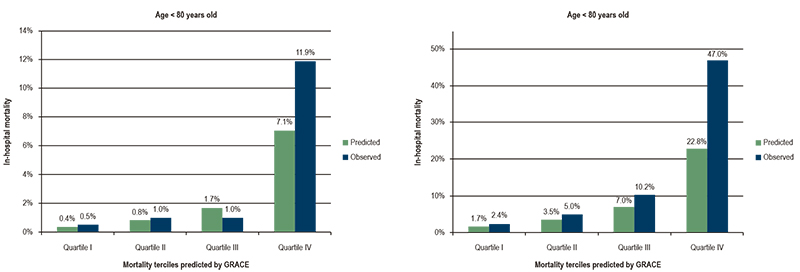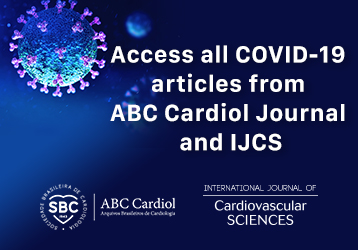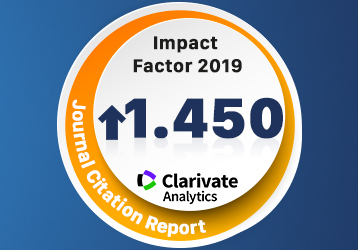Volume 110, Nº 1, January 2018
DOI: http://www.dx.doi.org/10.5935/abc.20170175
ORIGINAL ARTICLE
Prognostic Accuracy of the GRACE Score in Octogenarians and Nonagenarians with Acute Coronary Syndromes
Antonio Mauricio dos Santos Cerqueira Junior
Luisa Gondim dos Santos Pereira
Thiago Menezes Barbosa de Souza
Vitor Calixto de Almeida Correia
Felipe Kalil Beirão Alexandre
Gabriella Sant’Ana Sodré
Jessica Gonzalez Suerdieck
Felipe Ferreira
Marcia Maria Noya Rabelo
Luis Cláudio Lemos Correia

Figure 2 – Calibration of the GRACE Score in the prediction of in-hospital mortality in patients aged ≥ 80 years old versus < 80 years old with acute coronary syndromes. The graphics represent the comparison between predicted and observed mortality, in quartiles of probability predicted by the GRACE Score.
Abstract
Background: The GRACE Score was derived and validated from a cohort in which octogenarians and nonagenarians were poorly represented.
Objective: To test the accuracy of the GRACE score in predicting in-hospital mortality of very elderly individuals with acute coronary syndromes (ACS).
Methods: Prospective observational study conducted in the intensive coronary care unit of a tertiary center from September 2011 to August 2016. Patients consecutively admitted due to ACS were selected, and the very elderly group was defined by age ≥ 80 years. The GRACE Score was based on admission data and its accuracy was tested regarding prediction of in-hospital death. Statistical significance was defined by p value < 0,05.
Results: A total of 994 individuals was studied, 57% male, 77% with non-ST elevation myocardial infarction and 173 (17%) very elderly patients. The mean age of the sample was 65 ± 13 years, and the mean age of very elderly patients subgroup was 85 ± 3.7 years. The C-statistics of the GRACE Score in very elderly patients was 0.86 (95% CI = 0.78 – 0.93), with no difference when compared to the value for younger individuals 0.83 (95% CI = 0.75 – 0.91), with p = 0.69. The calibration of the score in very elderly patients was described by χ2 test of Hosmer-Lemeshow = 2.2 (p = 0.98), while the remaining patients presented χ2 = 9.0 (p = 0.35). Logistic regression analysis for death prediction did not show interaction between GRACE Score and variable of very elderly patients (p = 0.25).
Conclusion: The GRACE Score in very elderly patients is accurate in predicting in-hospital ACS mortality, similarly to younger patients. (Arq Bras Cardiol. 2018; 110(1):24-29)
Keywords: Acute Coronary Syndrome / mortality; Aged 80 years and over; Prognosis; Risk Assessment; Data Reliability.















